Table of Contents
The ongoing Israeli-Hamas conflict in Gaza continues to capture the world’s attention. The United Nations Security Council (UNSC), as the apex international body responsible for maintaining peace and security, has repeatedly failed to address the situation. This article delves into the reasons behind these failures, the role of the UNSC, the dynamics of its membership, and the implications for global peace.
Understanding the Ongoing Conflict
The Israeli-Hamas conflict in Gaza has been a longstanding and complex issue. Recent escalations have once again brought this conflict to the forefront of international affairs, prompting the need for UNSC intervention.
The Ongoing Story
- The UNSC, comprising 15 member states, is expected to play a crucial role in resolving international conflicts. However, it has recently struggled to find a common ground to address the Israeli-Hamas war.
- The rejection of both American and Russian resolutions underscores the deep divisions within the council, preventing effective action.
The UN Chief’s Perspective
- UN Secretary-General Antonio Guterres has emphasized the broader context in which this conflict unfolds.
- He highlights that Hamas’s attacks do not occur in isolation but must be understood in light of the prolonged Palestinian occupation, which has lasted for over five decades.
The Dilemma: Palestinian Grievances vs. Hamas Actions
- While acknowledging the historical injustices suffered by Palestinians, it is essential to consider whether these grievances justify the actions of Hamas.
- The organization has been responsible for launching rocket attacks on Israeli territory, leading to significant civilian casualties. The question remains: can the Palestinian cause be used to justify such actions?
The Role of the United Nations
To comprehend the UNSC’s inability to address the Israeli-Hamas conflict, we must first understand the structure and function of this influential international institution.
The United Nations: An Overview
- The United Nations was established after World War II to promote peace and cooperation among nations. The UNSC is its principal body responsible for maintaining global peace and security.
- It consists of five permanent members (P5) and ten non-permanent members, each with different roles and responsibilities.
The Permanent and Non-Permanent Members
- A key distinction lies in the power held by the P5. These nations—China, France, Russia (formerly the USSR), the United Kingdom, and the United States—enjoy a unique privilege known as the “right to veto.”
- This power allows any of the P5 members to block any UNSC resolution, even if it has widespread support among other member states. This has been a source of significant debate and controversy.
Understanding the Veto Power
- The veto power was conceived to encourage consensus among major powers and prevent unilateral actions that could lead to another world war.
- However, it has often been criticized for being used to protect national interests rather than maintaining global peace. The question of whether this veto power should be abolished remains contentious.
UNSC Reform and the Current Stalemate
The current state of the UNSC reflects its inability to adapt to contemporary global dynamics and address pressing issues like the Israeli-Hamas conflict. This raises questions about the need for reform.
UNSC Reform
- UNSC reform has been a subject of ongoing debate, with calls for increased representation and a reconsideration of the veto power. However, reforms require the consensus of the P5, and they have been reluctant to relinquish their privileges.
Determining Threats to Peace
- The UNSC’s role in determining threats to peace, breaches of peace, or acts of aggression is also under scrutiny.
- The Council’s effectiveness depends on its ability to respond promptly to such crises, which has proven challenging in recent times.
The Dysfunctional UNSC
- The current state of the UNSC is widely seen as paralyzed and dysfunctional in its present form. The Israeli-Hamas conflict is only one example of its inability to take decisive action.
- The core of this dysfunction lies in the unequal power distribution and the veto system, which hampers the Council’s ability to fulfill its mandate.
Conclusion
The Israeli-Hamas conflict highlights the ongoing challenges faced by the UNSC in its mission to maintain international peace and security. The role of the P5 and the veto power, along with the need for reform, remain pressing issues.
As long as the UNSC remains unable to adapt to the changing dynamics of global politics, it will continue to face criticism for its perceived ineffectiveness. The world watches with bated breath, hoping for a resolution to the Israeli-Hamas conflict and, perhaps, a reinvigoration of the UNSC’s ability to fulfill its critical role in global peace and security.



 TSPSC Group 1 Question Paper 2024, Downl...
TSPSC Group 1 Question Paper 2024, Downl...
 TSPSC Group 1 Answer key 2024 Out, Downl...
TSPSC Group 1 Answer key 2024 Out, Downl...
 UPSC Prelims 2024 Question Paper, Downlo...
UPSC Prelims 2024 Question Paper, Downlo...




